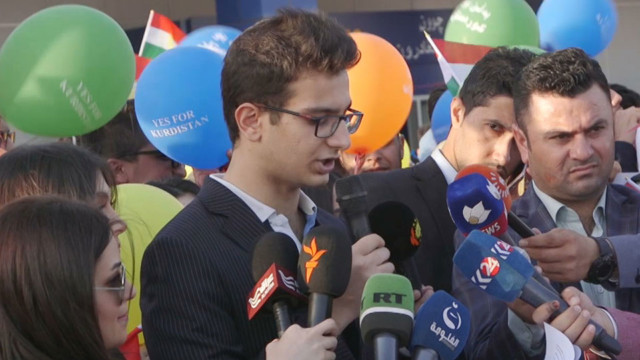Baghdad made good on its threat to close the airspace to international flights over the Kurdish Region of Iraq. It’s in response to the Region’s referendum on independence this week.
As CGTN’s Tony Cheng reports, the closure could have far-reaching consequences.
Protesters stand outside the Erbil International Airport, opposing the flight ban imposed on Iraqi Kurdistan by the central government in Baghdad.
The messages, tied to balloons for their Iraqi neighbors, are intended to convey opportunity, not anger. But there’s no mistaking the frustration at the ban on international flights.
“That’s why banning flights will have a direct impact on every member of society,” one protestor says, “and is considered as a group punishment against the people of the Kurdistan region and all the races, religions and ethnic groups living in Kurdistan.”
Most airlines had already cancelled their flights. Erbil is a regional transport hub, with more than a million travelers passing through every year. Easier visa regulations and good security have made this the gateway to Iraq—until now.
The check-in counters at Erbil International Airport are completely empty. The last international flight has already left, and for the indefinite future, no airline is going to be able to fly here except Iraqi airways direct to Baghdad.
It’s the first sanctions the Kurds are facing for their international referendum.
Talar Faiq, the general manager of the airport, was frustrated at the lack of direction from aviation authorities in Baghdad. But what she had been told was simple and clear.
“According to the note they issued already, that’s supposed to be until the 29th December this year,” she says. “But I see that it will be very difficult to go that far, because many people or other entities will be affected by that decision.”
The transit buses out of the terminal are packed with people who’d taken the last flight home.
But many others have been forced to leave.
Aid workers and NGO staff, foreign nationals, are providing assistance at the camps outside Mosul, which are now home to over a million displaced people.
Humanitarian flights are still allowed to land, but they need the express permission of Iraq’s Prime Minister.
Military flights will still be using Kurdish airspace. This is a vital hub for coalition aircraft in the fight against ISIL.
They remain, but their support staff have gone. The final departure has been delayed while they wait for permission to depart. But then, flight Z4660 guns its engines, leaving the Kurdistan region cut off.
 CGTN America
CGTN America

